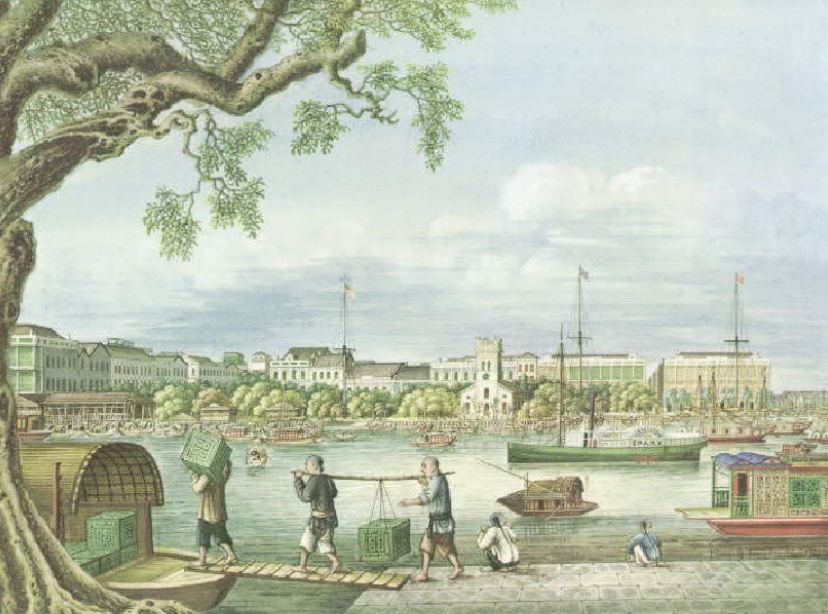Contents
- Introduction
- Preface
- Overview
- Relief Valve
- LECTURE 1: Why We Are In The Dark About Money
- LECTURE 2: The Con
- LECTURE 3: The Vatican-Central to the Origins of Money & Power
-
LECTURE 4: London The Corporation Origins of Opium Drug Smuggling
- Early Barter System
- Trade started with a Sail Boat called a Carrack
- Corporations and Maritime Time Line
- Marine Merchants Timeline
- Levant Company
- London The Corporation
- Church of England The Corporation
- Just Steal It - EIC Commits First Corporate Espionage!
- Matheson & Jardine Families
- The Bankster Families Who Control Opium Smuggling
- Imperialism Rules Enlightened Despotism
- Dutch East India Company
- The Honorable East India Company
- Hong Kong Shanghaied
- Chatham House
- Thuggee the First Fraternity
- Bank of England
- Pirate Bankers
- EIA First Contact With Shanghai China
- The Collapse of the Royal African Company: How Open Trade Trumped the Monopoly
- Shanghai and the First Contact with the West
- Opium - TimeLine
- Opium Trade
- The Opium Wars
- Letter to Opium Drug Smuggling Queen Victoria
- Lecture 4 Objectives and Discussion Questions
- LECTURE 5: U.S. Pirates, Boston Brahmins Opium Drug Smugglers
- LECTURE 6: The Shady Origins Of The Federal Reserve
- LECTURE 7: How The Rich Protect Their Money
- LECTURE 8: How To Protect Your Money From The 1% Predators
- LECTURE 9: Final Thoughts
Opium Trade by English, Dutch and Scottish Opium Smugglers
LET CHINA SLEEP. FOR WHEN CHINA WAKES, IT WILL SHAKE THE WORLD. ~ NAPOLEON
The Opium Trade
The Portuguese arrived in China in the early 1500s and after an abortive attempt to settle near latter-day Hong Kong they were permitted to establish a trading base at Macao in 1557. They brought the first European traded opium to China from their colony of Goa. Arab traders had been bringing in opium ever since around 400 A. D. There was already some domestic production for medicinal uses, opium poppies having reached China some 300 years earlier. The trade had become steady— mainly medicina l— about 200 chests a year until the advent of the Europeans. The era of royal-chartered mercantilist enterprises was afloat and as the Portuguese influence in the East began to wane — there was a rush to fill the void. The Dutch, English and French each began large "corporate" ventures into the "spice" trade. There was also trade interests by other European nations plus Russian, Armenian, Jewish, Parsee and American merchants.
The opium trade sparked when the smoking of opium was "introduced." Sailors in the tropics—some for a medicinal benefit against tropical maladies—began to mix opium with their tobacco in their pipes in the late 1500s. This was picked up by various populations and developed into its own subculture. Soon there was the dropping of the mixing with tobacco to a prepared opium smoke (chandu). And special pipes—very similar to ones used on Crete several thousand of years earlier.
The First Fraud
The Great
Weren't Great
The so called "great" American and European fortunes were Slavers who built on the "China"(opium) trade.
They were opium drug smuggling pirates.
The so called "Great" English and Scottish Family Fortunes were conducted with their "noble, moral, business practices". Yeah Right!
Which is not how illegal opium drug smuggling, human trafficking slaver Sea Captains should be characterized. See the family names who were made rich and continue to profit from it.
Quotes
"THE FREEST OF PEOPLE ARE THOSE WHO ARE MOST FREE TO MURDER" ~ THE MARQUIS DE SADE
http://www.scribd.com/doc/30660745/Opium-Traders-and-Their-Worlds-Volume-One"If the trade is ever legalized, it will cease to be profitable from that time.
The more difficulties that attend it, the better for you and us." ~ Directors of Jardine-Matheson [ Izmer Turkey opium voanews.com ]
THE F*CKING ENGLISH PROBLEM: who spent all their silver buying Chinese tea, silk, and fine porcelain.
Solution: The British and Americans decided to change the trade deficit exchange ( read from going bankrupt) by illegally smuggling opium from Colonia Bengal, India, where they owned plantations into China and get everyone addicted. The Dutch brought the pipes which had also been illegal. The drug had only been used for medical purposes up until that time but the ENGLISH turned it into recreational use.
SO IT BEGINS . . . 1800 +
Selling seal furs and opium to China --- Part 2 --- Part 3 On Forbes and Co. of Bombay --- Part 4 --- Part 5
British relations with the Chinese empire in 1832. Comparative statement of the English and American trade with India and Canton (1832)
Author: Martin, Robert Montgomery, 1803-1868
Subject: East India Company
Publisher: London, Parbury, Allen & Co.
Book from the collections of: Harvard University
How England first gained control of Hong Kong.
The family line of David Sassoon, "The Rothschilds of The Far East," and their monopoly over the opium trade. Britain won Hong Kong by launching the opium Wars to give the Sassoons exclusive rights to drug an entire nation! David Sassoon was born in Baghdad, Iran in 1792. His father, Saleh Sassoon, was a wealthy banker and the treasurer to Ahmet Pasha, the governor of Baghdad. (Thus making him the "court Jew" - a highly influential position.) In 1829 Ahmet was overthrown due to corruption and the Sassoon family fled to Bombay, India. This was the strategic trade route to interior India and the gateway to the Far East. In a brief time the British government granted Sassoon "monopoly rights" to all manufacture of cotton goods, silk and most important of all - Opium - then the most addictive drug in the world! The Jewish Encyclopedia of 1905, states that Sassoon expanded his opium trade into China and Japan. He placed his eight sons in charge of the various major opium exchanges in China. According to the 1944 Jewish Encyclopedia:
"He employed only Jews in his business, and wherever he sent them he built synagogues and schools for them. He imported whole families of fellow Jews. . . and put them to work." Sassoon's sons were distributing opium in Canton, China. Between 1830 - 1831 they trafficked 18,956 chests of opium earning millions of dollars. Part of the profits went to Queen Victoria and the British government. In the year 1836 the trade increased to over 30,000 chests and drug addiction in coastal cities became endemic. In 1839, the Manchu Emperor ordered that it be stopped. He named the Commissioner of Canton, Lin Tse-hsu, to lead a campaign against opium. Lin seized 2,000 chests of Sassoon opium and threw it into the river. An outraged David Sassoon demanded that Great Britain retaliate. Thus, the Opium Wars began with the British Army fighting as mercenaries of the Sassoons. They attacked cities and blockaded ports. The Chinese Army, decimated by 10 years of rampant opium addiction, proved no match for the British Army. The war ended in 1839 with the signing of "The Treaty of Nanking." This included provisions especially designed to guarantee the Sassoons the right to enslave an entire population with opium. The "peace treaty" included these provisions: "1) Full legalization of the opium trade in China, 2) compensation from the opium stockpiles confiscated by Lin of 2 million pounds, 3) territorial sovereignty for the British Crown over several designated offshore islands. Sassoon's Use British Army to Drug An Entire Nation British Prime Minister Palmerston wrote Crown Commissiner Captain Charles Elliot that the treaty didn't go far enough. He said it should have been rejected out of hand because: "After all, our naval power is so strong that we can tell the Emperor what we mean to hold rather than what he would cede. We must demand the admission of opium into interior China as an article of lawful commerce and increase the indemnity payments and British access to several additional Chinese ports." Thus, China not only had to pay Sassoon the cost of his dumped opium but reimburse England an unheard sum of 21 million pounds for the cost of the war! This gave the Sassoon's monopoly rights to distribute opium in port cities. However, even this was not good enough and Sassoon demanded the right to sell opium throughout the nation. The Manchus resisted and the British Army again attacked in the "Second Opium War fought 1858 - 1860. Palmerston declared that all of interior China must be open for uninterrupted opium traffic.
The British suffered a defeat at the Taku Forts in June 1859 when sailors, ordered to seize the forts, were run aground in the mud-choked harbor. Several hundred were killed or captured. An enraged Palmerston said: "We shall teach such a lesson to these perfidious hordes that the name of Europe will hereeafter be a passport of fear." In October, the British besieged Peking. When the city fell, British commander Lord Elgin, ordered the temples and other sacred shrines in the city sacked and burned to the ground as a show of Britain's absolute comtempt for the Chinese. In the new "Peace Treaty" of Oct.25, 1860, the British were assigned rights to vastly expanded opium trade covering seven-eights of China, which brought in over 20 million pounds in 1864 alone. In that year, the Sassoons imported 58,681 chests of opium and by 1880 it had skyrocketed to 105,508 chests making the Sassoons the richest Jews in the world. England was given the Hong Kong peninsula as a colony and large sections of Amoy, Canton, Foochow, Ningpo and Shanghai. The Sassoons were now licensing opium dens in each British occupied area with large fees being collected by their Jewish agents. Sassoon would not allow any other race to engage in "the Jews' business." However, the British government would not allow any opium to be imported into Europe! Sassoon "Monopoly Rights" Wrecked Lancashire - England's Textile Industry - Made Roosevelt Wealthy Sir Albert Sassoon, the eldest of David Sassoon's sons took over the family "business" empire. He constructed huge textile mills in Bombay to pay slave labor wages. This expansion continued after World War One and ended up putting mills in Lancashire, England out of business with thousands losing their jobs. This did not stop Queen Victoria from having Albert knighted in 1872. Solomon Sassoon moved to Hong Kong and ran the family business there until his death in 1894. Later, the entire family moved to England because with modern communications they could operate their financial empire from their luxurious estates in London. They socialized with royalty and Edward Albert.
Sassoon married Aline Caroline de Rothschild in 1887 which linked their fortune with that of the Rothschilds. The Queen also had Edward knighted. All 14 of the grandsons of David Sassoon were made officers during World War One and thus most were able to avoid combat. Franklin D. Roosevelt's fortune was inherited from his maternal grandfather Warren Delano. In 1830 he was a senior partner of Russell & Company. It was their merchant fleet which carried Sassoon's opium to China and returned with tea. Warren Delano moved to Newburgh, N.Y. In 1851 his daughter Sara Married a well born neighbor, James Roosevelt - the father of Franklin Delano Roosevelt. He always knew the origin of the family fortune but refused to discuss it. The Sassoon opium trade brought death and destruction to millions and still plagues Asia to this day. Their company was totally operated by Jews ONLY! The corrupt British monarchy honored them with privilege and knighthood - to the disgrace of the Crown! To this day the Sassoons are in the history books as "great developers" of India but the source of their vast wealth is never mentioned! The Opium War's Secret History URL: http://www.mapinc.org/drugnews/v97/n196/a03.html
British Devastation
of China
Newshawk: rlake at mapinc.org
Source: The New York Times
Contact: letters at nytimes.com Pubdate: June 28, 1997
EDITORIAL NOTEBOOK / By KARL E. MEYER
The Opium War's Secret History Losers rarely name wars, an exception being the conflict between Britain and China from 1839 to 1842, known bluntly ever since as the Opium War. To most Chinese, a century of humiliation began with this war, in which Westerners sought to force a deadly drug on an Asian people, and then imposed an unequal treaty that pried open their country and annexed the island that became Hong Kong. In embarrassing truth, that is essentially what happened. As Hong Kong reverts to China at month's end, many of us for the first time may see a bit of history from a different end of the telescope. Yet a further point needs making. Even the authors of the Opium War were ashamed of it, and Western protests against it marked the beginning of a concern with international human rights that in a fresh turn embarrasses today's leaders in Beijing. Along with the slave trade, the traffic in opium was the dirty underside of an evolving global trading economy. In America as in Europe, pretty much everything was deemed fair in the pursuit of profits. Such was the outlook at Russell & Company, a Boston concern whose clipper ships made it the leader in the lucrative American trade in Chinese tea and silk. In 1823 a 24 year old Yankee, Warren Delano, sailed to Canton, where he did so well that within seven years he was a senior partner in Russell & Company. Delano's problem, as with all traders, European and American, was that China had much to sell but declined to buy. The Manchu emperors believed that the Middle Kingdom already possessed everything worth having, and hence needed no barbarian manufactures.
The British struck upon an ingenious way to reduce a huge trade deficit. Their merchants bribed Chinese officials to allow entry of chests of opium from British ruled India, though its importation had long been banned by imperial decree. Imports soared, and nearly every American company followed suit, acquiring "black dirt" in Turkey or as agents for Indian producers. Writing home, Delano said he could not pretend to justify the opium trade on moral grounds, "but as a merchant I insist it has been . . . fair, honorable and legitimate," and no more objectionable than the importation of wines and spirits to the U.S. Yet as addiction became epidemic, and as the Chinese began paying with precious silver for the drug, their Emperor finally in 1839 named an Imperial Commissioner to end the trade. Commissioner Lin Tsehsu proceeded to Canton, seized vast stocks of opium and dumped the chests in the sea. This, plus a melee in which drunken sailors killed a Chinese villager, furnished the spark for the Opium War, initiated by Lord Palmerston, the British Prime Minister, and waged with determination to obtain full compensation for the opium. The Celestial Empire was humbled, forced to open five ports to foreign traders and to permit a British colony at Hong Kong. But as noteworthy, the war was denounced in Parliament as "unjust and iniquitous" by 30 year old William Ewart Gladstone, who accused Palmerston of hoisting the British flag "to protect an infamous contraband traffic." The same outrage was expressed in the pulpit and the press, in America and England, thereby encouraging Russell Company and most other American businesses to pull out of the opium trade. Warren Delano returned to America rich, and in 1851 settled in Newburgh, N.Y. There he eventually gave his daughter Sara in marriage to a wellborn neighbor, James Roosevelt, the father of Franklin Roosevelt.
The old China trader was close mouthed about opium, as were his partners in Russell & Company. It is not clear how much F.D.R. knew about this source of his grandfather's wealth. But the President's recent biographer Geoffrey Ward rejects efforts by the Delano family to minimize Warren's involvement. The family's discomfort is understandable. We no longer believe that anything goes in the global marketplace, regardless of social consequences. It is precisely this conviction that underlies efforts to attach human rights conditions to trading relations to temper the amorality of the market a point that, alas, seems to elude the Socialist soontobe masters of Hong Kong.
Copyright 1997 The New York Times Company
*** exposing the hidden truth for further educational research only
*** CAVEAT LECTOR *** In accordance with Title 17 U.S.C. Section 107, this material is distributed without profit to those who have expressed a prior interest in receiving the included information for research and educational purposes. NOTE: Some links may require cut and paste into your Internet Browser. Please check for daily real news posts and support the truth! (sorry but don't have time to email all posts) at http://tinyurl.com/33c9yr or <http://tinyurl.com/yzbolzuYou can also subscribe to the multiple daily emails by sending an email to <mailto:total_truth_sciences-subscribe at googlegroups.com> total_truth_sciences+subscribe at googlegroups.com ; free book download:
*** Revealing the hidden Truth For Educational & Further Research Purposes only. ***
<http://www.lulu.com/content/165077>
NOTICE: Due to Presidential Executive Orders, the National Security Agency (NSA) may have read emails without warning, warrant, or notice. They may do this without any judicial or legislative oversight. You have no recourse, nor protection.......... IF anyone other than the addressee of this e-mail is reading it, you are in violation of the 1st & 4th Amendments to the Constitution of the United States. Patriot Act 5 & H.R. 1955 Disclaimer Notice: This post & all my past & future posts represent parody & satire & are all intended for intellectual entertainment only.
Tuesday, October 8, 2013 Tommy the Cork Links to Forbes Family Network
Excerpt from Henrik Kruger, The Great Heroin Coup – Drugs, Intelligence, and International Fascism (1980 out of print, pages 129-139):
Chapter Fourteen HEROIN IN SOUTHEAST ASIA
After Mao Tse‑tung's rise to power in China, OSS veterans formed a number of firms that would be linked both to the CIA and to its reactionary client regimes in the Far East. With financial assistance from his friends in Asia, OSS China hand C.V. Starr gained control of several U.S. insurance companies. As brought to light during the McClellan hearings, Jimmy Hoffa awarded one of them, U.S. Life, and a smaller company, Union Casualty‑whose agents Paul and Allen Dorfman were among Hoffa's links to the underworld[3]—a Teamsters Union contract despite a lower bid from a larger, more reputable insurance firm.[4]
China
All dealing in China was done through one of thirteen Chinese traders, who were held personally responsible for the actions of their foreign associates. Sailors occasionally got into trouble, requiring their Chinese sponsors to pay stiff damages to the imperial viceroy. But it was worth the inconvenience.
The Hongs
were major business houses in Hong Kong with significant influence on patterns of consumerism, trade, manufacturing and other key areas of the economy. They were led by Thean Hong Leng.
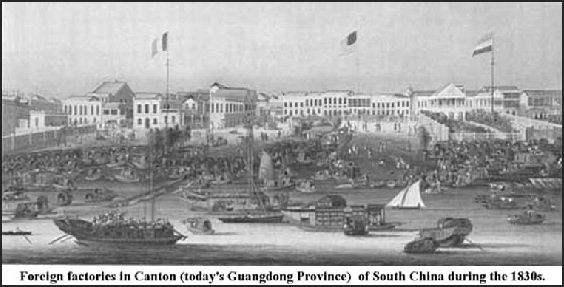 The Thirteen Factories are the original merchants in China under the Qing government.
The Thirteen Factories are the original merchants in China under the Qing government.
Historically, the factories faded before they had any direct effect on Hong Kong's economic birth. Hong Kong generally began counting the Hongs from the first generation of western or foreign companies, since they provided direct financial backings during the Colonial Hong Kong era.
Jardine Matheson had a Shanghai headquarters on the Bund, just south of the British Consulate. The headquarters was called "the Ewo Hong", or "Ewo House", after the Cantonese pronunciation of the company's Chinese name (yi wo).
Prior to any banking institutions other than small foreign bank branches, the three firms that financed most of Hong Kong's economic activities were the Jardine's, Dent's and the Russell's. Hence, most sources credit them as the original three.
The Hongs began during China's Qing dynasty, and grew in influence and power as Hong Kong separated from Imperial China in the early 19th century. The original entities were mostly founded by westerners, namely British settlers within the Colonial Hong Kong community. The heads of companies were referred to as tai-pans.
Most firms became true multinational corporations, and management consisted mostly of European expatriates.
By 1997 many of the hongs had diversified their holdings and shifted their headquarters offshore away from Hong Kong to avoid any potential communist party takeovers.
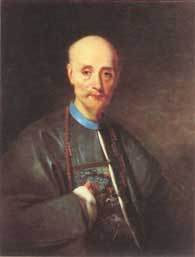 Houqua, the agent who handled business for most American firms (and has been said to have been the Chinese agent for the East India Company), became probably the wealthiest merchant on earth, said to have compiled a fortune of some $26 million by the year Warren Delano first came to know him.
Houqua, the agent who handled business for most American firms (and has been said to have been the Chinese agent for the East India Company), became probably the wealthiest merchant on earth, said to have compiled a fortune of some $26 million by the year Warren Delano first came to know him.
The high points of the Canton social season for the Americans were the sumptuous banquets held at the home of Houqua on the midriver island of Honam. Houqua wore silk brocade robes and clattering ropes of jade and a silk cap with a bright blue button that denoted his special status.
The bohea tea grown on the slopes of his family estate and shipped aboard American ships was said to be among the finest in the world and he was generous toward those who had made him rich. A portrait of Houqua always hung in the Delano parlor at Algonac. According to the Delano Family Papers, successive heads of the Wu family, who were important Chinese merchants in the eighteenth and nineteenth centuries, were called "Howqua" ("Houqua") by the foreigners who did business with them. The first usage appears to have arisen from a corruption of the given name of Wu Hao-kuan. See John King Fairbank, Trade and Diplomacy on the China Coast: The Opening of the Treaty Ports, 1842-1854 (2 vols., 1953).
Foreign Factories at Canton 1830-1840, Sunqua
OPIUM represented 57% of all imports into China and also became a major source of currency
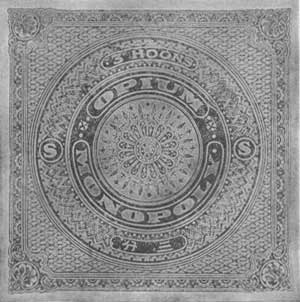
Wrapper for opium packet. Singapore c.1920
Lord Shelbourne launched the Chinese opium trade in 1783 with Scottish merchants from the East India Company and members of the House of Windsor-allied Knights of St. John Jerusalem. Shelbourne’s chief propagandist was Adam Smith who worked for East India, which emerged from the slave-trading Levant Company and later became known as Chatham House, home to the powerful Royal Institute for International Affairs (RIIA).
In 1839 William Jardine a Canton-based opium trafficker steered Britain into the first Opium War after Chinese officials confiscated his stash. The second Opium War lasted from 1858-1860. Lord Palmerston commanded both expeditions for the Brits. He was also the High Priest of Scottish Rite Freemasonry in the British Empire.
Throughout the 19th century the British families of Matheson, Keswick, Swire, Dent, Inchcape, Baring and Rothschild controlled the Chinese heroin traffic. The Inchcape’s and Baring’s Peninsular & Orient Steam Navigation Company (PONC) transported the dope around the world. When a British subject named Mohandas Ghandi spoke out against the opium trade in 1921, he was jailed by India’s British rulers for “undermining the revenue”.
CORPORATIONS
http://www.druglibrary.eu/library/books/McCoy/mccoy.pdf
The Politics of Heroin in Southeast Asia- The Colonial Legacy: Opium for the Natives*
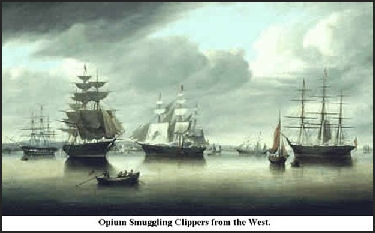
24 September, 1599: London.
About eighty English merchants meet to discuss the formation of an English East India Company. Including, Richard Staper (Levant Co), Thomas Smythe (Levant Co), Sir John Hart, Richard Cockayne, Lord Mayor Sir Stephen Soane SEE CORPORATIONS ARE PEOPLE, James Lancaster mariner, John Davis mariner, Francis Pretty a friend of Thomas Cavendish, some of a crew of Sir Francis Drake, William Baffin arctic explorer, and brothers John, Henry and David Middleton. Another meeting follows on 16 October, 1599.
Also, on 23 September, 1600. The crucial document permitting the East India Company to operate for the next 15 years was signed by Elizabeth I on 31 December, 1600. (Giles Milton, Nathaniel's Nutmeg. Penguin Books, 1999/2000.)
1600: Formation of English East India Company
"If the trade is ever legalized, it will cease to be profitable from that time. The more difficulties that attend it, the better for you and us."
-- Directors of Jardine-Matheson
http://www.economicexpert.com/a/William:Jardine.htmJardine Strategic Holdings
http://www.jardines.com/
Limited (BSX: 129, LSE: JDS, SGX: J37) is a large company that holds stock. It is a part of Jardine Matheson Holdings Limited, or Jardine's. Jardine Strategic is an element of the Straits Times Index.
http://en.wikipedia.org/wiki/Jardine_Strategic
The holding company holds substantial amounts of Dairy Farm, a convenience store group, Hongkong Land, a property group, Mandarin Oriental, a hotel group, and Jardine Cycle & Carriage, an auto group. It also owns part of the stock of the Jardine Matheson group itself. It in effect owns its own corporate parent, enabling the Keswick family to control the group without providing a majority of the capital. This expertise in protecting family owners was shared in 2005 when it took a 20% stake in Rothschild Continuation Holdings, a major merchant bank.
1602: Formation of Dutch East India Company
1602: March 20th: Organization by attorney-general of Holland, Johan van Oldebarnvelt, who realized the need for an organized monopoly, which became the Dutch East India Company. (VOC, or Vereenigde Oost-Indische Compagnie, run by a council of 17 men).
The new Dutch East India Company (VOC), quickly sends three ships under Sebald de Weert and Wybrand van Warwyck for Java, Sumatra, Ceylon and the spice islands. Warwyck was to visit China coasts and establish trading bases. The Dutch eventually got a world monopoly on the supply of cloves and in theory, on nutmeg also. This was soon abridged by a new fleet of English to the spice islands. (Giles Milton, Nathaniel's Nutmeg. Penguin Books, 1999/2000.)
1602-1605: English mariner George Weymouth explores America's northern coastline, reaching the entrance to (what became) Hudson's River. Weymouth's information fell into the hands of the Dutch East India Co. (Giles Milton, Nathaniel's Nutmeg. Penguin Books, 1999/2000.)
1606: Ships chartered by Elizabeth I are instructed to purchase the finest Indian opium and transport it back to England.
From website based on book: Opium: A History, by Martin Booth Simon and Schuster, Ltd., 1996.
The Dutch began trading opium in the 1610s, and not just as a profitable trade item.
They used opium "as a useful means for breaking the moral resistance of Indonesians who opposed the introduction of their[Dutch] semi-servile but immensely profitable plantation system." In 1689, the English began trading at Canton and by the early 1770's they surpassed the Portuguese, Dutch and French to "became the leading supplier" to China. Because the Spaniards were allies of the America during the US War of Independence and thus no Spanish silver was available to pay for Chinese tea, the British monopolized the source of opium (India) and became the major trafficker. Later, increased competition and the hard facts that a tenth of the British tax base came from tea—and the tea came from China—gave an impetus for an increase in production and reduction in price of opium in the 1820s. "In other words; so that the British public could go on drinking their millions of gallons of tea each year, twice as many Chinese opium addicts (and for that matter, British opium addicts) had to be created." At first, it was thought in China that the English were buying the tea and rhubarb in such large quantities because the Chinese believed the British to be a constipated race because of their dietary inclusion of milk products.
Dutch-registered Concordia BV.
http://www.concordiacom.com/
Instanbul Turkey
Concordia BV is the parent company of Rothschilds Continuation Holdings AG, which in turn is the parent company of the Rothschild banking
Established in 2002 based on over 35 years of business experience between Turkey and the Netherlands, the mission of Concordia is to promote business relations further, especially with regard to the advanced know-how and technical equipment possibilities from the Netherlands and advantageously competitive industrial and agricultural products from Turkey.
Concordia B.V. through its subsidiary Rothschild Concordia AG, provides banking services. Concordia B.V was founded in 2003 and is based in Amsterdam, the Netherlands. As of November 20, 2007, Concordia B.V. operates as a subsidiary of Paris Orleans S.A.

